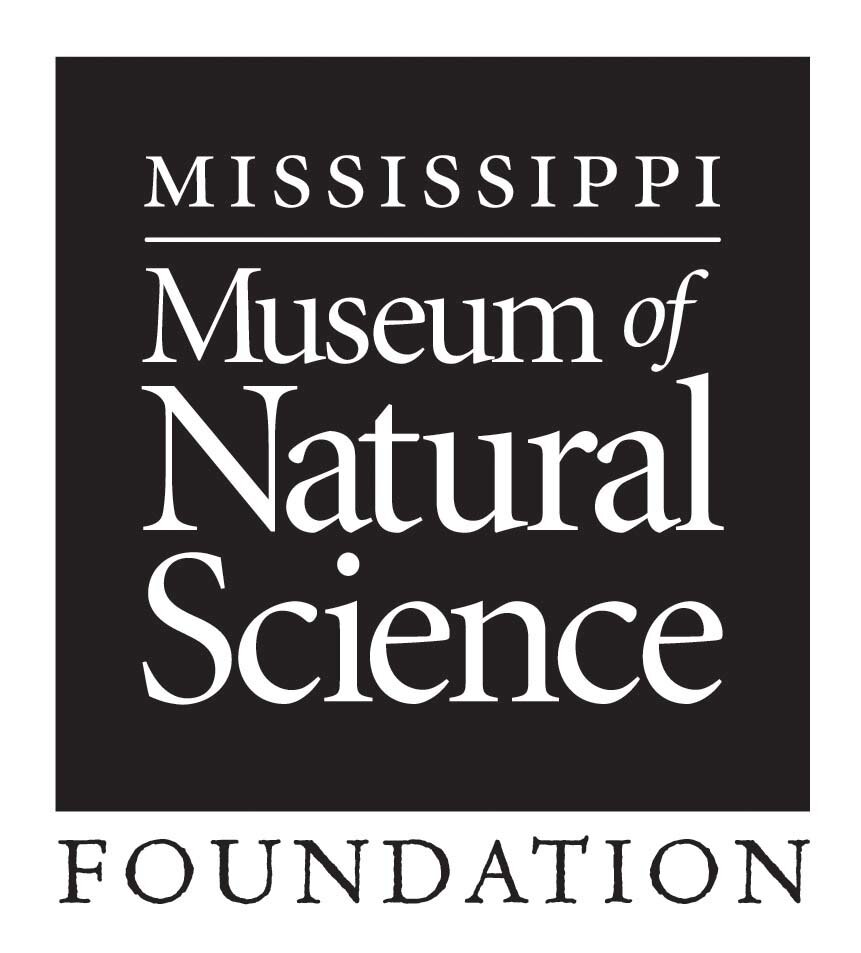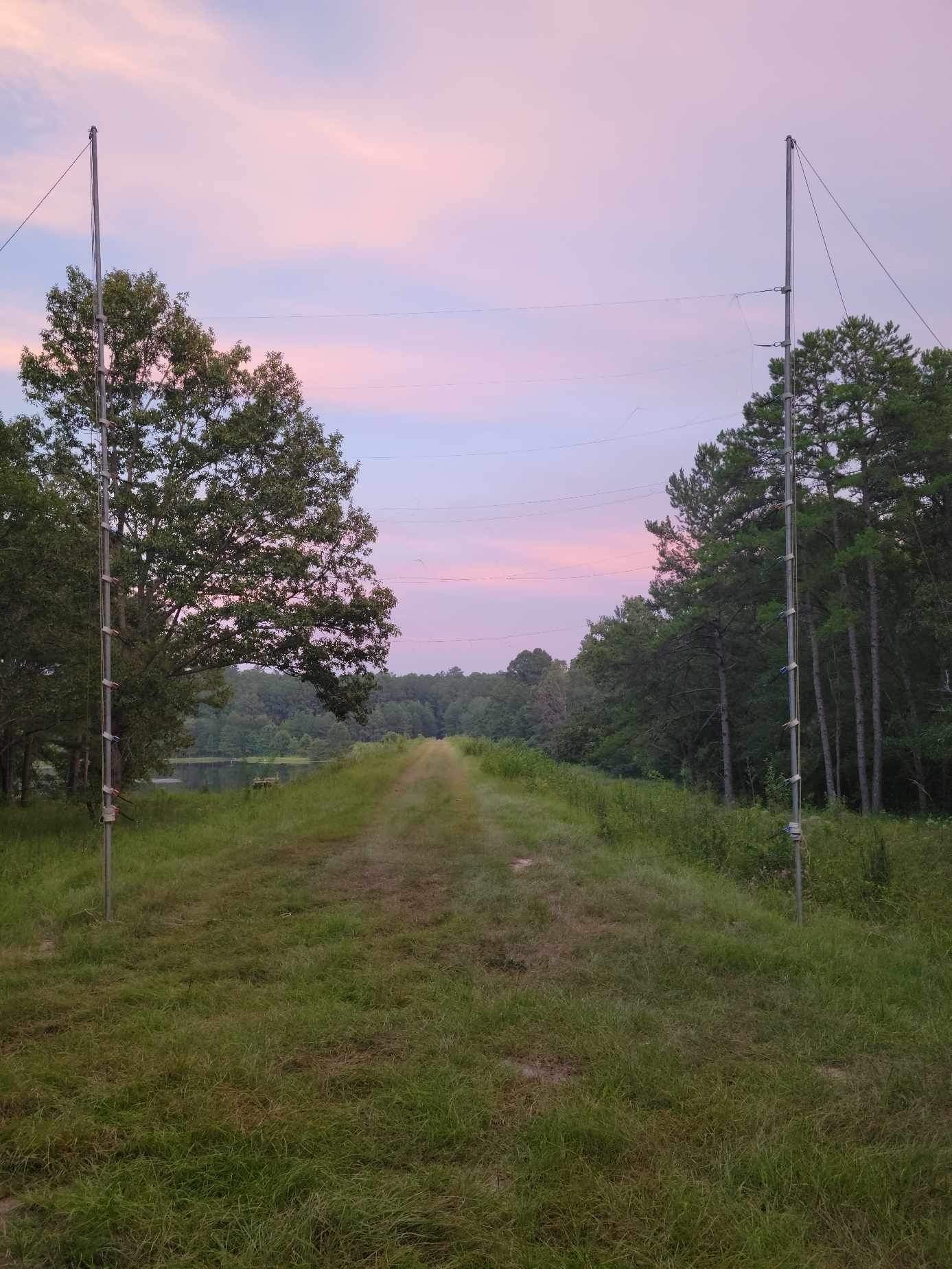Curious about what you can do with a Bachelor’s degree in Wildlife Management? Meet Jack Creely! He’s doing the things he loves and helping conserve Mississippi’s natural beauty - from conducting field work, like bat surveys, to installing special exhibits and maintaining the Museum’s collections with his peers.
Like Jack says, “Who wouldn’t want to be outside catching bats and crawling in caves?”! Jack’s enthusiasm, skill, and dedication make him a valuable member of our team!
HOW LONG HAVE YOU WORKED FOR MDWFP’S MISSISSIPPI MUSEUM OF NATURAL SCIENCE?
I started my position with the Museum in May 2021.
WHAT’S YOUR WORKDAY LIKE?
It varies from day to day or season to season.
This past summer, from April to September, we conducted mist net surveys at night from 6 p.m. to midnight. Mist netting consists of putting these very thin, black nets up that are hard to see with the naked eye. We can set a single high, which is just one net, or a double or triple high.
Triple high mist net
The bats get caught by flying into the net, and we check the nets every 10–15 minutes. If we have a bat, we get it out of the net and then weigh the bat in the bat bag, measure forearm length, wing score, determine sex, and reproductive status, and determine if the epiphyseal gap of the finger joint is fused, determining whether it is adult or juvenile.
Besides caves and culvert surveys, we do bridge and bridge deflector surveys. I am currently working on a project about the usage of bridge debris deflectors by bats.
Also, this summer I traveled to three of our state Wildlife Management Areas (WMAs) around Mississippi each month to swap the SD cards in the game cameras on our AHDrift fences. During 2022, we set a total of 9 Adapted-Hunt Drift Fence Technique traps, 3 at each WMA. The fencing is set up using a drift fence with inverted buckets at each end. Animals moving along the drift fence can pass through the inverted buckets with two 6x6" cutouts that have been added to the bottom of the buckets. We installed trail cameras in the buckets to take pictures of the animals as they pass underneath.
During the winter, we survey caves and culverts. The bats go into a state of torpor, which is like hibernation. When we conduct culvert surveys, we walk through and count the bats. While in caves and culverts, we swab the culvert, cave walls, and the bats for the fungus Pseudogymnoascus destructans, or Pd for short. Pd is the fungus that causes White-Nose Syndrome, which is a disease that affects hibernating bats.
When I’m not in the field, I am at the Museum. Aside from all the awesome field work, we have an amazing mammalogy collection that we continue to add to with specimens that we prep. This helps us preserve the species from that time and space that it was collected for use by future biologists, maybe years from now. We have a fish, freshwater mussel, herpetology, botany, and paleontology collections.
Every 6 months to a year we get new, traveling exhibits that everybody helps to build or put together for the public to enjoy. We also help with the events that the Museum is hosting.
Working at the Museum gives you so many opportunities to learn so many different taxa and skills. I have even had opportunities to help with fish surveys and freshwater mussel surveys.
ANY FUNNY WORK STORIES?
One time, I was assisting in a mussel survey on the Pearl River, and our ichthyologist pulled the boat up to the bank. You expect the depth of water to be about 2 feet, but before I jumped out, one of my colleagues beat me to it, and let's just say that the water was way deeper than 2 feet - more like 7 feet. It was just hilarious because we didn’t expect it to be that deep since we were right along the bank, so he hopped off the boat and just disappeared - and then reappeared!
TELL US A BIT ABOUT YOUR BACKGROUND AND EDUCATION
I grew up in Madison, MS. My family has a farm in Noxapter, MS, and that is where my love for the outdoors started. As a kid, I would just ride my four-wheeler around our farm. I love to fish and hunt.
I graduated from Madison Central High School in 2016. During high school, my favorite classes were my environmental science classes, so I think that’s where it started to click that that’s what I wanted to pursue.
After I graduated high school, I went to Northwest Community College to play football. After two football seasons at Northwest, I transferred to Delta State University, where I had to find my major and figure out what I wanted to do after school. So, I started majoring in wildlife management and just really enjoyed my classes like wildlife techniques, mammalogy, and ecology.
I received an email from one of my professors about an internship at the Mississippi Museum of Natural Science over the summer. I applied and got it, which was during COVID, so we had to stay at the Museum and couldn’t do any field work.
All summer I did inventory and data entry, but I heard all the great stories and things we would have done in the field if it wasn’t for COVID. But the summer was fun, and I got some experience on the Museum side of things, but I wanted the field experience.
I went back to Delta State for my last semester and graduated with my Bachelors in Wildlife Management. I wanted to go back to the Museum, so I emailed my supervisor and asked if they were still doing internships. I got my internship back, but it turned into a full-time position, and here I am. Doing the things I love!
I have a beautiful wife, Taylor, and two sweet dogs, Chief and Goose. I love going to the movies and watching movies at home with my wife. I also like playing video games and spending time relaxing at home.
WHY DID YOU CHOOSE THIS CAREER?
I chose this career because it’s fun, and it’s something that I’m passionate about and want to make a change about.
I’m not in the office all day, every day. I’m outside in the woods with wildlife and beautiful plants and trees around me.
I travel all over Mississippi and see how beautiful this state is and its rich history.
Who wouldn’t want to be outside catching bats and crawling in caves?
It’s something different every year. I love this career, and I’m excited to grow and learn.
Swabbing for PD in a cave
HOW DOES YOUR JOB CONTRIBUTE TO CONSERVATION?
My job contributes to conservation by conducting research, monitoring, and implementing strategies to protect and manage wildlife populations and their habitats.
ANY ADVICE FOR A STUDENT INTERESTED IN A BIOLOGY OR MUSEUM CAREER?
Get your name out there! Networking is important.
Apply for internships while you are in the process of getting your Bachelor’s degree.
Volunteering is also a great way if you can’t get an internship.
Doing research projects and presenting at events and conferences is very helpful.
It’s all about getting a foot in the door.





